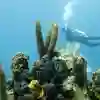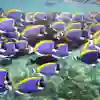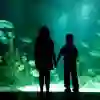





Dive into Marine Conservation: Preserving Ocean Life and Biodiversity at the University of Hull.
The call to protect our oceans is urgent. At Hull, you join a programme designed to equip you with the skills and knowledge to address today’s critical marine conservation challenges. Stand out to future employers by mastering not only marine ecology, biology and biodiversity principles but also the socio-economic and policy dimensions that shape marine conservation efforts worldwide.
This course will help you gain hands-on experience with fieldwork, coastal site visits, and practical sessions at local facilities, including The Deep, where you’ll work directly with marine conservation experts.
About this course
In this programme, you’ll dive into essential skills for marine conservation, such as designing biodiversity monitoring schemes for ocean ecosystems and assessing environmental threats to marine life. You’ll also explore the critical socio-political dimensions of conservation in coastal and ocean environments, exploring issues such as overfishing, habitat loss, human-wildlife conflict, and emerging conservation challenges. This is expertise that employers in marine conservation urgently seek - positioning you miles ahead in your journey to a meaningful career in protecting our oceans.
You’ll explore how marine conservation is influenced by human communities, uncovering the challenges posed by these interactions and their effects on aquatic health. Alongside this, you’ll examine the legal and policy structures at both national and global levels that govern and guide conservation practices across the world’s oceans.
This course also covers industry level practical skills that you’ll use for the rest of your career. Our modules cover advanced data analysis and habitat monitoring, as well as practical marine conservation, where you’ll gain get hands-on experience. You’ll undertake multiple field trips to examine marine conservation problems and projects on our coastline, and learn from expertise in ex-situ conservation at The Deep, a local award winning aquarium with over 5,000 animals. You will be able to use our industry level facilities in the Marine Biology laboratory.
Building on your advanced knowledge and research skills, you’ll undertake a large-scale project. With guidance, you’ll lead an individual research project or dissertation focused on a marine-related topic of your choice, with options to collaborate on ongoing research. Your project might involve creating a conservation plan for a specific marine species or habitat, analysing public opinion on a debated conservation issue, collecting ecological data to inform conservation action, or pursuing other areas of interest. This project allows you to shape your degree around your passion, equipping you with the experience needed to excel in your marine conservation career.

MSc Marine Conservation
2 mins
Module options
For a full Masters degree, you'll study 180 credits over the duration of your course. Some programmes offer a Postgraduate Diploma (PGDip) qualification or a Postgraduate Certificate (PGCert) qualification. For a PGDip, you'll study 120 credits, and for a PGCert, you'll study 60 credits.
Filters
Marine Conservation Project
The project involves a desk/archive-based, data analysis, lab or field project and written project report on a subject agreed between the student and staff in a field relevant to Marine conservation. Each student conducts, with assistance, an individual research project or dissertation, which is supervised for the duration of the project by an expert or experts in their respective field(s). The subject will be chosen in T2 and students will submit an initial literature review which will go on to form part of the dissertation at the beginning of T3. There may be opportunities to participate in existing research projects and/or have a placement with an external organisation. Some projects may consist of a series of related studies using different techniques that form chapters in a dissertation.
core
60 credits
Global Conservation
This module will give students an understanding of how conservation operates from a global to a national scale, including the roles of international bodies, legal and advisory frameworks and NGOs. Students will learn how these cascade into national level frameworks and legislation, and the benefits and drawbacks of these approaches.
compulsory
20 credits
Research Skills in Environmental Sciences
It is more important than ever that future environmental scientists are well-equipped with the skills needed to critically assess environmental research. This module will provide you with the key skills required to assess and integrate contemporary literature and to analyse and interpret complex data to become an independent researcher.
compulsory
20 credits
Ecology for Conservation
This module will deal with ecological principles at both the population and community level. The important theoretical foundations of the subject will be covered, allowing further exploration of how these lead into practical conservation issues and will deal with ecological principles at both population and community level. The important theoretical foundations of the subject will be covered, allowing further exploration of how these lead into practical conservation issues.
compulsory
20 credits
People and Conservation
Wild animals often live in close proximity to people, and conservation of those animals has important impacts on those people. This module will introduce a series of important topics associated with conservation and society, including a consideration of how successful conservation programmes can be designed in collaboration with local people rather than in conflict with them.
compulsory
20 credits
Marine Biodiversity and Assessment
Discover the essential methods for assessing marine life and habitats to drive effective conservation. In this module, you'll explore cutting-edge techniques for measuring marine biodiversity, estimating population sizes, and analysing data, all within the context of current environmental policies. Learn how to turn data into actionable insights, empowering you to contribute to evidence-based marine conservation planning and monitoring.
compulsory
20 credits
Practical Marine Conservation
Gain hands-on experience in marine conservation by working with leading organizations on projects like seagrass restoration, fisheries conservation, and citizen science. You'll engage with industry professionals, participate in practical conservation efforts, and learn key skills like grant writing and fundraising. Fortnightly seminars and reflective sessions will help you evaluate the impact of these projects, culminating in a personal essay and a grant proposal for a conservation initiative.
compulsory
20 credits
Our academics
Our School of Environmental Sciences brings together world-leading marine, earth and social scientists, each with diverse backgrounds spanning research, industry, and conservation.
They bring their knowledge, hands-on experience, and passion for the ocean into everything they teach, giving you the chance to learn directly from those shaping the future of marine science and conservation.

Dr Charlotte Hopkins
Senior Lecturer
Charlotte's current research includes understanding human perceptions of the marine environment and how these can be incorporated into conservation, planning, marine management and sustainable use.

Professor Robert Knell
Professor of Zoology
Rob is a Professor of Zoology and an active researcher with interests in a variety of different aspects of ecology and evolution, mainly to do with either parasites, immune systems, sex or all three.
Entry Requirements
What do I need?
When it comes to applying for this Postgraduate Taught degree, you'll need an Undergraduate degree (or equivalent). For this course, you'll need a 2:1 from a relevant bachelor's degree.
The programme is designed for graduates who have studied a subject that is relevant to this course.
If you’re an undergraduate student at Hull, you’re guaranteed a fast-track route to this postgraduate degree, as long as you meet the entry requirements.
In order to ensure our students have a rich learning and student experience, most of our programmes have a mix of domestic and international students. We reserve the right to close applications early to either group if application volumes suggest that this blend cannot be achieved.
Typical offer
2:1 in a relevant subject area
At Hull, we request an entry grade tariff of 2:1 in a related field.
Fees & Funding
How much is it?
Tuition fees for 2027 entry have not been confirmed. Please use 2026-27 information as a guide.
Scholarships
We offer a number of awards, bursaries and scholarships for eligible students. They’re awarded for a variety of reasons including academic achievement and/or to help those on lower incomes.
Scholarships and bursaries are separate to student loans. And the best bit is, you don’t pay a penny back.
Alumni Postgraduate Scholarship
University of Hull undergraduates progressing to a taught masters course may receive a 20% discount on the cost of their tuition fees.
Find out if you’re eligible by visiting the University of Hull Alumni Postgraduate Scholarship page.
See more Scholarships
We offer a range of scholarships and awards to students at the university to help with their financial load.
To view all of our scholarships and determine whether you're eligible, please visit our Scholarships and Awards page.
Marine Conservation Facilities

Future prospects
There is an urgent global need for skilled and area-focused marine conservation professionals who possess not only a solid understanding of ecological and management principles but also the ability to navigate the complex socio-political landscapes inherent to conservation work. Graduates from this program will be equipped to pursue diverse careers, for example as a:
Marine Conservation Manager, Aquatic Ecologist, Research Scientist, Project Manager, Policy Advisor, Campaigns Officer, Academic and many more.
Take your career to the next level
Like what you’ve seen? Then it’s time to apply.
Make your application online now, and our admissions team will get back to you as soon as possible to make you an offer.
Not ready to apply yet?
We regularly deliver virtual and on-campus events to help you discover your perfect postgraduate course, whether it’s a subject you already love or something completely different. Our events are an opportunity for you to chat to tutors and current students and find out about the career options a postgraduate degree could lead to.
You may also be interested in...
All modules presented on this course page are subject to availability and this list may change at any time.